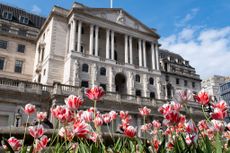What's happening to UK mortgage rates?
Mortgage rates have been rising since late February, hitting house price inflation in the process. Here's what the situation could mean for you.


Mortgage rates have been on the rise once again over the past week. Major lenders, such as Nationwide, Santander and Leeds Building Society have been among those to up their interest rates.
The rot started when inflation failed to go down by as much as had been hoped in January - an issue that we've seen time and again since the rate started to fall from its record high in late-2022. This economic data has hit market expectations of when the Bank of England will move to cut interest rates.
Markets had been expecting a new year cut, but ongoing concerns about inflation - and the potential for high wage growth to fuel it - have meant the Bank of England has delayed cuts until at least June, possibly August.
Subscribe to MoneyWeek
Subscribe to MoneyWeek today and get your first six magazine issues absolutely FREE

Sign up to Money Morning
Don't miss the latest investment and personal finances news, market analysis, plus money-saving tips with our free twice-daily newsletter
Don't miss the latest investment and personal finances news, market analysis, plus money-saving tips with our free twice-daily newsletter
While this situation initially meant mortgage rates were plateauing, they have been rising steadily since late February. Statistics from Moneyfacts show we are almost back to the level we were seeing in early January.
They have risen by an average of half a percentage point to 5.93% for a typical two-year fix and 5.5% for an average five-year deal. While these rates are still well below the highs seen over the summer of 2023, it means around 1.5 million borrowers who are still on cheap fixed-rate mortgages could get a big shock when they remortgage. The situation has already hit house prices, Nationwide says.
Here's everything you need to know about what's currently taking place.
Which lenders are raising mortgage rates?
Most major lenders have entered another cycle of increasing their mortgage rates over the past two weeks. We have seen rises of at least 0.2%, with some going even further and hiking rates by more than 0.4% overall.
Nationwide, Halifax, Barclays, NatWest, HSBC, Santander, Accord and Leeds Building Society are several big names that have upped their rates. Experts say the initial increase was due to a spike in swap rates in mid-April.
This had been caused by March's set of headline inflation data and wage growth figures, which both came in hotter than expected and led to concerns that the interest rate freeze will remain in place for longer. However, subsequent increases may have been down to lenders wishing to avoid stretching themselves with too many customers.
It should be pointed out that not all lenders are upping rates. On Tuesday (30 April), Skipton Building Society said it was cutting some of its fixed and tracker products, and relaunching its high loan-to-value (LTV) products.
When will mortgage rates go down?
At present, there appears to be little hope of any mortgage rate cuts until there is greater certainty about Bank of England base rate cuts. "The market is in dire need of some positive movement from the Bank of England," says Nicholas Mendes, mortgage technical manager at John Charcol. "Until we see a rate reduction we're going to see a period of rate increases as markets start to be unsettled.
"Mortgage holders coming to the end of their fixed deals this year and in early 2025 will need to be prepared to see rates that are higher than previous predictions. Initial forecasts of a 3.5% fixed rate by August to late September this year are very unlikely, with any sign of such a deal now pushed back to later in the year."
He added: "While the temptation will be to wait and hold out for the best deal, it is strongly recommended that you regularly speak with a broker so you can understand the options available to you until your deal is due to expire."
Even if rates do start to come down soon, the lows of the late 2010s are unlikely to be replicated. Earlier this year, Sarah Coles, head of personal finance at the investment platform Hargreaves Lansdown, warned that an "era of super-low rates” was not on the horizon, even if mortgage rates fell.
But she said that any fall in rates would “be enough of a shift to make a material difference to remortgagers", as well as those buyers "who had been priced out of the market”.
While the economic outlook is still difficult for many people, there is a bit of hope for some property buyers. For example, some lenders are offering more innovative products, which could aid first-time buyers. One of them is Yorkshire Building Society, which unveiled a 99% loan-to-value mortgage last month.
The mortgage rate is just one aspect of a deal though. Borrowers need to watch out for extra mortgage costs as many deals have high fees attached that could offset any savings compared with other deals with higher rates but lower charges. Mortgage product fees have increased to £1,141 on average as of early March, up £46 compared with this time last year.
What about variable mortgage rates?
About 2.2 million homeowners are on variable-rate mortgages, which are tied to the BoE’s base rate. The average standard variable rate (SVR) is an eye-watering 8.18%, while slightly less flexible trackers are at 6.12%.
Those on a high SVR would be wise to switch onto a fixed rate now. Even if fixed rates fall later this year, the money they save from getting rid of their expensive SVR earlier could make it worth it.
Coles says that there is hope for remortgagers waiting for cheaper fixes to emerge: "Over the coming months, we will see mortgage rates ease. Fixed deals will get cheaper, and they should finally see the huge pressure on their budgets start to ease."
What about buy-to-let rates?
Last summer, buy-to-let mortgage rates were pushing 7%. They have since come down from these sky-high levels. As of 3 May, average buy-to-let rates were 5.61% for a two-year fix, and 5.6% for a five-year deal, Moneyfacts said. However, rates still remain high relative to pre-cost of living crisis levels.
These high buy-to-let mortgage rates - coupled with a 3% stamp duty surcharge and less generous mortgage interest tax relief - are making things tough for landlords. But sentiment in the sector remains mostly positive, according to recent research by Leaders Romans Group.
Mortgage support available
Mortgage rates are much higher than when many people would have last remortgaged. Millions of homeowners will be coming off rates as low as 1% or 2%.
If you’re struggling to make your mortgage repayments, the good news is that lenders representing 90% of the mortgage market have signed up to the government’s mortgage charter. They include the big banks like Halifax, HSBC and Santander and building societies like Nationwide, Leeds and Skipton.
The charter is a series of support measures intended to help those in difficulty. Borrowers will be able to make a temporary change to their mortgage for six months to give them some breathing space, such as switching to interest-only payments or extending their mortgage term to reduce their monthly payments. Customers have the option to revert to their original term within six months by contacting their lender.
Meanwhile, there is a 12-month delay before repossession proceedings can start against those who have missed payments. Regardless of whether your lender has signed up to the charter, all lenders also have a range of measures in place for customers experiencing difficulties.
Should I overpay my mortgage?
If you’ve got some spare cash and you're on a low rate, overpaying your mortgage can be a good way to protect yourself before your mortgage deal expires and you have to remortgage at a much higher rate. Our mortgage overpayment calculator shows how your monthly repayments will change and help you decide if it is worth it.

Henry Sandercock has spent more than eight years as a journalist covering a wide variety of beats. Having studied for an MA in journalism at the University of Kent, he started his career in the garden of England as a reporter for local TV channel KMTV.
Henry then worked at the BBC for three years as a radio producer - mostly on BBC Radio 2 with Jeremy Vine, but also on major BBC Radio 4 programmes like The World at One, PM and Broadcasting House. Switching to print media, he covered fresh foods for respected magazine The Grocer for two years.
After moving to NationalWorld.com - a national news site run by the publisher of The Scotsman and Yorkshire Post - Henry began reporting on the cost of living crisis, becoming the title’s money editor in early 2023. He covered everything from the energy crisis to scams, and inflation. You will now find him writing for MoneyWeek. Away from work, Henry lives in Edinburgh with his partner and their whippet Whisper.
- Ruth EmeryContributing editor
-
 Bank of England holds interest rates at 16-year high
Bank of England holds interest rates at 16-year highNews Interest rates have been frozen at 5.25% for the sixth consecutive monetary policy meeting. Here is what it means for your money.
By Marc Shoffman Last updated
-
 RICS: Property listings rise, but buyer demand cools
RICS: Property listings rise, but buyer demand coolsNew listings are putting a spring in the step of the UK housing market – but where have the buyers gone? We delve into the latest Royal Institution of Chartered Surveyors (RICS) survey
By Ruth Emery Published